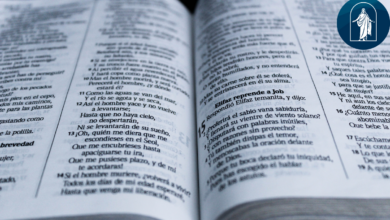The joy of the Lord is our strength Psalms: where to find it?
The joy of the Lord is our strength Psalms, where it is? In the vastness of the Holy Scriptures, the Psalms emerge as an inexhaustible source of spiritual inspiration and reflection.
These songs and poems, skillfully intertwined with the human journey, capture the deepest emotions of the soul, offering words of comfort, praise, gratitude and hope. Read with us and find out where it is “the joy of the Lord is our strength Psalms", let's go!
The joy of the Lord is our strength Psalms, where is it?
The phrase “The joy of the Lord is our strength” is a well-known biblical passage that is not found in the book of Psalms, as many people believe, but in the Old Testament, in the book of Nehemiah, chapter 8, verse 10.
In this verse we find a powerful message of hope and encouragement from Nehemiah, the Jewish leader who played a vital role in rebuilding the walls of Jerusalem after the Babylonian exile.
The full passage says: “And he said unto them, Go, eat the fat things, drink the sweet things, and send portions unto them that have nothing prepared for them; because this day is consecrated to our Lord; therefore do not be sad; for the joy of the Lord is your strength.”
In this context, Nehemiah is encouraging the people to find joy in the Lord, recognizing that this joy is the source of their spiritual strength.
The message is a powerful reminder that true joy and trust in God are fundamental to facing life's challenges.
Therefore, this passage not only reveals the source of spiritual strength, but also highlights the importance of finding joy in the presence and blessings of the Lord, regardless of circumstances.
Common questions
Who was Nehemiah in the Bible?
Nehemiah was a prominent figure in the Old Testament of the Bible, known for his leadership and courage. He was a cupbearer to the Persian king Artaxerxes I, but his heart was deeply tied to his Jewish nation.
Upon hearing about the precarious situation of the walls of Jerusalem and the Jewish people after the Babylonian exile, Nehemiah was moved by compassion and determination.
With the king's permission, he led a mission to rebuild the walls of Jerusalem, transforming himself into an effective community leader.
Nehemiah not only guided the people in the physical reconstruction of the city, but also exhorted them to spiritual renewal, promoting the observance of God's Law. His story is a testimony of faith, dedication and perseverance, leaving a lasting legacy of restoration and spiritual inspiration.
Who destroyed the walls of Jerusalem that Nehemiah rebuilt?
The walls of Jerusalem, which were rebuilt by Nehemiah, were originally destroyed by the Babylonians in 586 BC during their siege of the city.
King Nebuchadnezzar II led the Babylonian forces that invaded Jerusalem, destroying Solomon's Temple and the city walls. This event marked a significant period in the history of the Jewish people, known as the Babylonian Exile.
During the reconstruction under the leadership of Nehemiah, which took place in the 5th century BC, the Jews restored the walls as an attempt to protect the city and its people from future attacks and invasions.
The rebuilding of Jerusalem's walls under Nehemiah was a crucial part of the national and spiritual restoration after the Babylonian Exile.
How did Nehemiah end up in Persia?
Nehemiah was taken to Persia due to the political and social circumstances of his time. After the Babylonian exile, where the Jews were deported to Babylon, a few decades later, the Persian Empire, under the reign of King Cyrus II, conquered Babylon in 539 BC
As a result of this conquest, the Jews were allowed to return to their homeland, including Jerusalem, to rebuild the Temple and the city.
Nehemiah, during this period, held a prominent position as cupbearer to King Artaxerxes I, successor to Cyrus II. As the royal cupbearer, Nehemiah was responsible for the king's safety and well-being, thus earning his trust.
In his role at the Persian court, Nehemiah had the opportunity to influence the king regarding the situation of the Jews in Jerusalem.
His empathy and desire to help his people led him to ask the king for permission to lead the mission to rebuild the walls of Jerusalem, a permission he was granted, allowing him to return and play a crucial role in the city's restoration.
What characterized the revival in Nehemiah?
The revival in Nehemiah was characterized by a profound spiritual awakening and a restoration of faith among the Jewish people.
Upon returning to Jerusalem and leading the rebuilding of the city walls, Nehemiah not only focused on physical restoration but also encouraged spiritual renewal among the inhabitants. This revival was marked by several crucial aspects:
First, Nehemiah promoted a return to obedience to God's Law. He instructed the people to know and observe the Scriptures, reintroducing the Word of God into the lives of the people.
Secondly, there was fervent repentance. The people, under Nehemiah's leadership, confessed their sins, seeking forgiveness and spiritual purification. There was a deep humility before God.
Furthermore, Nehemiah encouraged unity and cooperation among people. He reinforced the importance of caring for each other, promoting a supportive and loving community.
The revival in Nehemiah was also marked by celebration and gratitude. Following the successful completion of the walls, there was a solemn dedication feast, during which the people praised God for His favor and protection. To the next!

